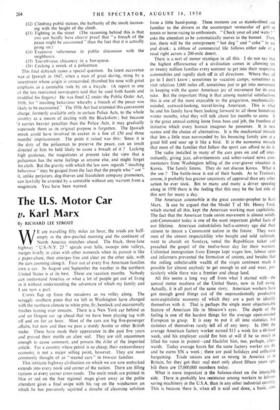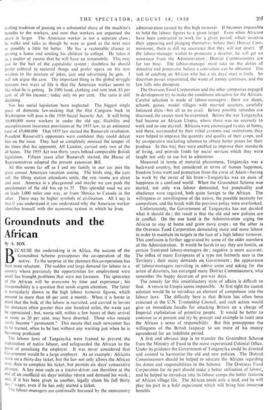The U.S. Motor Car v. Karl Marx
By RICHARD LEE STROUT
WE are travelling fifty miles an hour, the roads are half- empty in the dew-pearled morning and the continent of North America stretches ahead. The black, three-lane highway " U.S.-N.Y. 23 " spirals over hills, swoops into valleys, merges briefly in cities with other numerals when its pursuit is like a paper-chase, then emerges free and clear on the other side, with the cars zooming along it.. Four out of every five American families own a car. In August and September the weather in the northern United States is at its best. These are vacation months. Nobody can understand America or what a lot of people get out of living in it without understanding the adventure of which my family and I are now a part.
Crov4 flap up from the meadows as we volley along. The scraggly southern pines that we left in Washington have changed with the northern climate to white pine, fir, hemlock and occasionally birches leaning over streams. There is a New York car behind us and an Oregon car up ahead that we have been playing tag with off and on for an hour. Most of the cars are big five-passenger affairs, but now and then we pass a sturdy Austin or other British make. These have made their appearance in-the past five years and proved their mettle on alien soil. They are still uncommon enough to cause comment, and possess the éclat of the imported article. For a country where petrol is so cheap, their extraordinary economy is not a major selling point, however. They are most commonly thought of as " second cars " in two-car families.
This intricate highway civilisation on which we are now embarked extends into every nook and corner of the nation. There are filling stations at every corner cross-roads. The main roads are printed in blue or red on the free regional maps given away as the polite attendant gives a final swipe with his rag on the windscreen on which he has previously squirted a douche of cleansing solution
from a little hand-pump. _ These motions are as standardised and familiar to the drivers as the counterpart vernacular of golf or tennis or horse-racing to enthusiasts. " Check your oil and water? asks the attendant as he automatically moves to the bonnet. Then, too, there will be the omnipresent " hot dog " and " coke " to eat and drink : a ribbon of commercial life follows either side of a road right across a 200-mile desert.
There is a sort of motor mystique in all this. I do not say that the highest efflorescence of a civilisation comes in allowing ten or twenty million families every summer to get into their respective automobiles and rapidly dash off in all directions. Where they all go to I don't know ; sometimes to vacation camps, sometimes to visit relatives 3,000 miles off, sometimes just to get into movement in keeping with the queer American joy of movement for its own sake. But the important thing is that among material satisfactions this is one of the most enjoyable to the gregarious, mechanically- minded, outward-looking, travel-loving American. This is what he and his family have been looking forward to all those humdrum winter months, what they will talk about for months to come. It is the great annual cutting loose from boss and job, the freedom of initiative which every human imagines he possesses. It is new scenes and the choice of alternatives. It is the mechanical miracle that lets a little man surrounded by his bouncing family aim at a great hill and soar up it like a bird. It is the economic miracle that most of the families that follow the sport can afford to do it.
The radio installed in many of the cars goes on and off inter- mittently, giving jazz, advertisements and sober-voiced news com- mentators from Washington telling of the ever-graver situation in Korea. The family listens. They do not discuss Korea. What is the use ? The battle-issue is out of their hands. As to Truman's course, it probably has greater unanimity of approval than any other action he ever took. Bat to many and many a driver speeding along in 1950 there is the feeling that this may be the last ride of this sort for many a day.
The American automobile is the great counter-prophet to Karl Marx. It can be argued that the Model T of Mr. Henry Ford, which started all this, kept the American working man capitalistic. The fact that the American trade union movement is almost solidly anti-Communist today is one of the most important global facts of our lifetime. American industrialists half-a-century ago did their utmost to insure a Communist nation in the future. They were men of the utmost respectability who bought and sold railroads, went to church on Sundays, voted the Republican ticket and preached the gospel of the twelve-hour day for their workers. Unlimited immigration from Europe kept wages low, labour spies and informers prevented the formation of unions, and besides that the rolling unbelievable wealth of the virgin continent made it possible for almost anybody to get enough to eat and wear, par- ticularly while there was a frontier and cheap land.
All this seems a long way off from what I started with—the annual motor madness of the United States, now in full swing. Actually, it is all part of the same story. American workers have got enough good. things out of the unprecedentedly productive semi-capitalistic economy of which they are a part to identify themselves with it. That is perhaps the single most objectionable feature of American life in Moscow's eyes. The depth of the feeling is one of the hardest things for the average open-minded European to grasp. It is easy to put it all into statistics. but statistics of themselves rarely tell all of any story. In 1900 the average American factory worker earned $13 a week for a 60-hour week, and his employer could fire him at will if he so much as lifted his voice in protest—and blacklist him, too, perhaps, after- wards. Today average hours for the same factory worker are 40, and he earns $56 a week ; there are paid holidays and collective bargaining. Trade unions are not as strong in America as in Britain, for they got their real start only about fifteen years ago, brit there are 15,000,000 members today. What is more important is the balance-sheet on the intangible side. There is probably less resistance among workers to labour- saving machinery in the U.S.A. than in any other industrial country. This is because there is, when all is said and done, a basic, con-
trolling tradition of passing on a substantial share of the machine's benefits to the workers, and now that workers are organised the share is larger. The American worker is not a separate class ; he walks and talks as though he were as good as the next man or possibly a little bit better. He has a reasonable chance at owning a home and sending his children to college. He takes it as a matter of course that he will have an automobile. This may just be the bait of the capitalistic system ; doubtless he should prefer cultural to material things and prefer opera on his new wireless to the mixture of jokes, jazz and advertising he gets. I will not argue the case. The important thing in the global struggle between two ways of life is that the American worker seems to like what he is getting. In 1900 food, clothing and rent took 83 per cent. of all his income ; today only 66 per cent. The ratio is still declining.
Nor has social legislation been neglected. The biggest single piece of domestic law-making that the 81st Congress back in Washington will pass is the 1950 Social Security Act. It will bring 10,000,000 more workers in under the old age, disability and unemployment insurance provisions of the 1935 law, to an estimated total of 45,000,000. That 1935 law started the Roosevelt revolution. President Roosevelt's opponents were confident they could defeat him on the issue. They had so completely misread the temper of the times that his opponent, Alf Landon, carried only two of the 48 States. The 1935 Act was thirty years behind comparable British legislation. Fifteen years after Roosevelt started, the House of Representatives adopted the present extension Bill.
All this seems far off as I and my family in our car join the great annual American vacation outing. The birds sing, the cars roll, the filling station attendants smile, the rest rooms are clean and neat. America is a playground and maybe we can push the speedometer of the old bus up to 55 This splendid road we are on leads 3,000 miles one way, or from Mexico to Canada in the other. There may be higher symbols of civilisation. All I say is that if you understand it you understand why the American worker identifies himself with the economic system in which he lives.



































 Previous page
Previous page